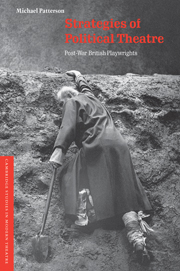Book contents
- Frontmatter
- Contents
- Acknowledgments
- Brief chronology, 1953–1989
- Introduction
- Part 1 Theory
- Part 2 Two model strategies
- Part 3 The reflectionist strain
- 4 The dialectics of comedy: Trevor Griffiths's Comedians (1975)
- 5 Appropriating middle-class comedy: Howard Barker's Stripwell (1975)
- 6 Staging the future: Howard Brenton's The Churchill Play (1974)
- Part 4 The interventionist strain
- Conclusion
- Notes
- Select bibliography
- Index
4 - The dialectics of comedy: Trevor Griffiths's Comedians (1975)
Published online by Cambridge University Press: 22 September 2009
- Frontmatter
- Contents
- Acknowledgments
- Brief chronology, 1953–1989
- Introduction
- Part 1 Theory
- Part 2 Two model strategies
- Part 3 The reflectionist strain
- 4 The dialectics of comedy: Trevor Griffiths's Comedians (1975)
- 5 Appropriating middle-class comedy: Howard Barker's Stripwell (1975)
- 6 Staging the future: Howard Brenton's The Churchill Play (1974)
- Part 4 The interventionist strain
- Conclusion
- Notes
- Select bibliography
- Index
Summary
My plays are never about the battle between socialism and capitalism. I take that as being decisively won by socialism. What I'm really seeking is the way forward. How do we transform this husk of capitalist meaning into the reality of socialist enterprise?
This ‘decisive’ victory, anticipated by Trevor Griffiths in an interview in 1976, was characteristic of the optimism of most of the playwrights discussed in this volume. By the early 1970s when most ‘Angry Young Men’ – if indeed they ever existed outside the minds of journalists – were becoming placid middle-aged men, a new generation of playwrights began to emerge in Britain. This ‘second wave’ of left-wing writers, born after 1940, were largely persuaded of the imminent demise of capitalism. Yet, within three years Margaret Thatcher would win the British general election and initiate widely acclaimed radically right-wing policies, and within less than a decade and a half Communism would collapse in Eastern Europe. In hindsight, the prediction by Malcolm Sloman in Griffiths's The Party of 1973 sounds hopelessly inaccurate: ‘There'll be a revolution, and another, and another, because the capacity for “adjustment” and “adaptation” within capitalism is not, contrary to popular belief, infinite.’ If not infinite, capitalism's ability to sustain itself is clearly destined to continue well into the twenty-first century.
This is one reason why the majority of Griffiths's plays now seem dated, with Comedians as an example of a play that will, exceptionally, stand the test of time and that shows Griffiths at his best.
- Type
- Chapter
- Information
- Strategies of Political TheatrePost-War British Playwrights, pp. 65 - 82Publisher: Cambridge University PressPrint publication year: 2003



